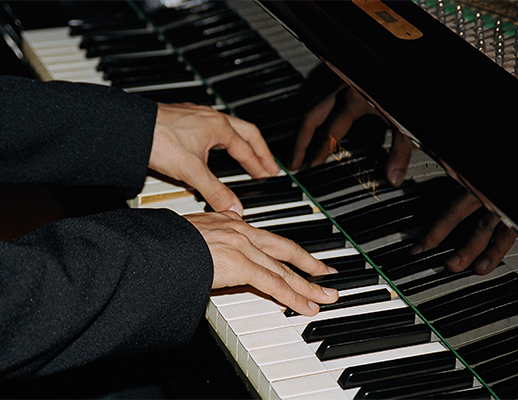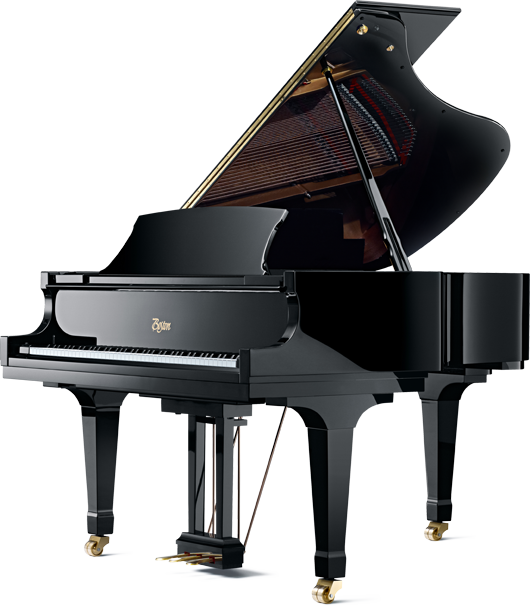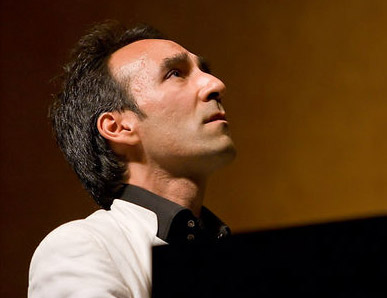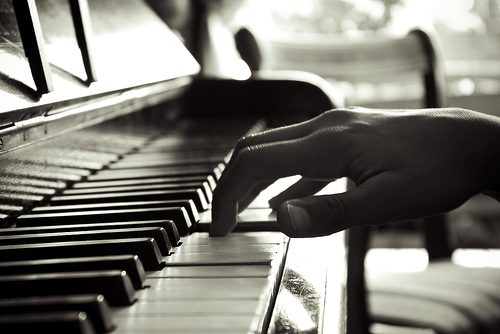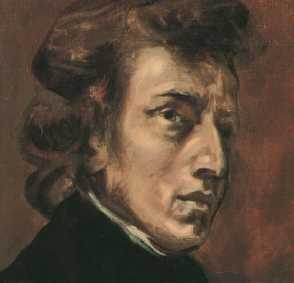La Muse Affiliée:
Tristan Lauber : A Passion for Music
by Gayle Colebrook
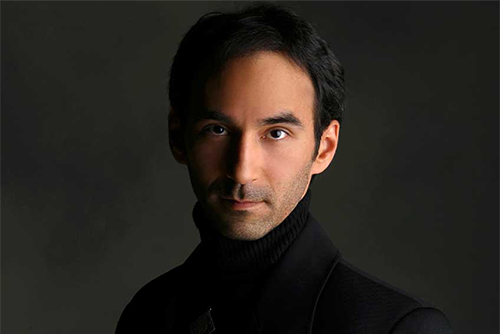 “Music is the most powerful of the arts: it reaches deep in to the heart of the human soul. It is the art that best expresses and conveys the tremendous spectrum of human emotion.” Tristan Lauber’s passion for music was clearly evident as he enthusiastically talked about his career in piano performance and pedagogy. Seated in the corner booth of an Outremont café, he stopped stirring his cappuccino and gestured emphatically. “It’s a total dedication that stops just short of obsessiveness,” he said, describing the commitment required to make a success of a concert career. “I’ve seen obsessiveness lead to nervous breakdown. One must completely refuse to compromise musical integrity and be able to sustain the quality of performance and love for music through concert after concert.” This integrity carries over into his pedagogical approach.
“Music is the most powerful of the arts: it reaches deep in to the heart of the human soul. It is the art that best expresses and conveys the tremendous spectrum of human emotion.” Tristan Lauber’s passion for music was clearly evident as he enthusiastically talked about his career in piano performance and pedagogy. Seated in the corner booth of an Outremont café, he stopped stirring his cappuccino and gestured emphatically. “It’s a total dedication that stops just short of obsessiveness,” he said, describing the commitment required to make a success of a concert career. “I’ve seen obsessiveness lead to nervous breakdown. One must completely refuse to compromise musical integrity and be able to sustain the quality of performance and love for music through concert after concert.” This integrity carries over into his pedagogical approach.
A Passion in Training
Mr. Lauber’s passion for his art was recognized later than one would expect, but it has remained his lifelong focus. His musical education had an unconventional start: at age nine, he started playing on his own. His mother, the composer Anne Lauber, would encourage him, offering the odd hint without actively directing or teaching him. He then attended the Le Plateau Elementary School, which offered a combined musical and academic education. By grade 4 he was playing relatively advanced pieces for his age. Formal training began when he auditioned and was accepted into the Conservatoire de Montréal at age ten. He studied there for a few years but by his own admission was a “difficult student” whose desire to play increasingly difficult works was more developed than his technique.
The key role that a teacher may play in the pedagogical and intellectual development of their student should never be underestimated. His or her influence may go beyond the subject taught to affect the student’s outlook on life. Contrasting the career of pedagogue with that of the concert pianist, Mr. Lauber stated that “the requirements are completely different than those demanded of the performer, and there are few who can do both equally well. ” According to him, a good teacher is an “extraordinarily patient person with boundless reserves of energy, compassion and empathy for young people. It’s someone with a high degree of emotional intelligence, the ability to read people,s emotions as to better relate. This is important, as 60% of human interaction is non-verbal.”
Looking back, he can see these qualities in his own teachers. At about age 14, he began to work with Louis Lortie, who was only nine years older. Lortie became not only a teacher, but also a mentor and a friend with whom to go out for pizza after a lesson. Mr. Lauber recalls Lortie’s exceptional ability to sit down an play anything.
Later, at University, Mr. Lauber worked with Marc Durand. Of Durand he acknowledges, “He was an exceptional guide who was very patient with me. His strongest quality was his open-mindedness with regard to approaches in pedagogy and performance. He had a wonderful sense of style, but nevertheless frequently encouraged us to work with other teachers, seeking out and listening to different musical interpretations.”
Mr. Lauber was also a pupil of Monique Deschausées, the well-known author and pedagogue, whose phenomenal encyclopedic knowledge inspired him to broaden his cultural and artistic horizons and to adopt a global view of the arts, coming to an understanding of the correlation between music, literature and fine arts.
With André Laplante, he developed sound projection and discovered a love for the interpretation of Romantic music and a desire to make this music his own as well, in line with his own passionate nature. He considers Laplante’s recordings of Romantic music among the best he’s heard. As for Anton Kuerti with whom he also worked, he admired not only the tremendous energy in his phenomenal interpretation of Beethoven and Brahms, but also his great humility in the face of music.
This attitude of non-judgemental open-mindedness has become part of Mr. Lauber’s own musical philosophy; to listen to others and explore different approaches far enough to be able to discern their positives and negatives, either absorbing, adapting or rejecting them after careful consideration. He applies this attitude in his own pedagogical technique.
A Passion for Teaching.
Mr. Lauber currently teaches here in Montreal, but has toured extensively in the Far East, both performing and teaching. He has been a guest lecturer and has given masterclasses at the Universty Putra Malaysia, Sedaya college in Kuala Lumpur and the Royal Conservatory of Music (Toronto) in Seoul. He is going back in April to perform the Tchaikowsky concerto with the Malaysian National symphony Orchestra. I asked him what motivated his choice of venues. “Apart from the fact that I’m half Vietnamese, I’ve always been fascinated by asian culture, and Buddhist philosophy. I admire the Asian dedication and discipline. I believe that in the 21st century , the most important catalyst for human evolution will be the meeting of East and West, the sharing of philosophical , social and political ideologies of our respective cultures.”
For example, these differences can be noted in the emphasis placed upon practicing in our different cultures. “In Korea, for example, parental involvement is very intense, and their children must practice constantly, while in Canada, parents generally have a more laid-back attitude, consideration being given to a child’s wants and desires. I can see advantages and disadvantages to both methods. I feel that the best would be a mingling of the two cultures, as too much discipline can be as detrimental as too little.” On pedagogy, he notes that “Korean teachers emphasize technique very early on.: finger work in Czerny, followed by the Chopin Etudes, working to perfect accuracy and speed. In doing this, however, the student’s sense of style isn’t as developed as it could be. However, this is beginning to change with an increasing openness toward Western pedagogical approach.’
Mr. Lauber believes in teaching kids to love music by creating good memories. They should be encouraged to attend age-appropriate live performances to broaden their musical perspectives. While discipline is needed such as in the practicing of technique, students should come to relate music with enjoyment , relaxation and happiness, not stress. In this respect, the teacher must stay balanced “Always remember that there’s only so much that one can do” he says, “If a student isn’t responding, be patient ; perhaps the time isn’t right for that student to believe in your solutions.”
This is particularly evident in the masterclass setting, where the teacher must pay attention to the student’s self-esteem. “I don’t believe in public humiliation. The masterclass experience should leave a student encouraged and proud, feeling a difference between his first and last performance.” He recalls a rewarding experience in the Philippines: “During a masterclass session, I taught a young girl who was playing Chopin’s 2nd Scherzo. She was extremely tight and stiff, on the verge of tendonitis. We worked together for 90 minutes and at the end of the session, she played the Scherzo again. It was a totally different performance: she was free of tension and the sound was wonderful. I’ll never forget the look on that student’s face, as well as the expressions of those in the audience. It was truly memorable. Afterwards, she came back to thank me.”
Generally speaking, Mr. Lauber believes that teachers should emphasize the basics, among which a strong sense of pulse and a clear idea of phrasing are most important. They should also teach technique that will enable performance, so students can play anything without pain or fatigue. “Among the most common deficiencies in piano students are poor hand position, a lack of firmness in the fingers and bridge, with a corresponding lack of freedom in the arms, along with an underdeveloped sense of pulse,” states Mr. Lauber. “Teachers should never let students play anything without pulse.” A student should also always strive for a naturalness of sound that conveys an understanding of piano resonance and tonal color. When performing, the student should show enthusiasm, with the love of music shining through his interpretation.
Passion for Chopin.
The works of Chopin present particular challenges to both teacher and student. Mr. Lauber’s conference Teaching the Works of Chopin is designed to aid teachers and students to overcome these and better understand the works of this Romantic composer. When asked why he chose to lecture on this topic, he replied: “He is the one composer who wrote exclusively for the piano. From a technical point of view, he pushed the levels of piano technique to unsurpassed levels. He is one of the most important composers for learning how to make the piano sing. Chopin’s love of vocal music comes through in his works, making them among the most useful for helping students achieve a singing tone at the keyboard. Through this conference, I hope to guide teachers in overcoming technical difficulties to understand the stylistic nuances of his works.”
According to Mr. Lauber, the two most challenging aspects of Chopin’s works are 1: to overcome the technical difficulties so the music sounds as if it’s playing itself and 2: to develop a singing tone. Unlike Beethoven, where students should initially stay away from some of the later sonatas because of their intensely spiritual content, Chopin’s music comes from the heart, making it more accessible and appropriate for the younger student. However, a certain degree of care should be exercised as to whom and when Chopin’s works are assigned. The student must have the musical maturity needed to grasp the sensitivity of the music, as well as to enjoy it.
Mr. Lauber suggest starting with some of the preludes, nocturnes (c# minor, e minor, Bb minor) and waltzes, using the mazurkas to develop rhythm. ‘I would caution against giving the preludes to a musically weak student as a concert, exam or competition piece. However, I do believe that they are excellent therapy, and should be used to develop musicality. As for the etudes, the teacher should be careful not to assign them too early on, and to prepare them with the study of the Czerny etudes.”
To aid the teacher and student in the interpretation of Chopin’s works, Mr. Lauber suggests the following books: Alfred Cortot’s Aspects of Chopin, and Jean Jacques Eigeldinger’s Chopin Pianist and Teacher As Seen by his Pupils. As for recordings, he suggests the following: for nocturnes, polonaises and ballades, Arthur Rubinstein; for preludes, Arthur Rubinstein or Martha Argerich; for etudes, Alfred Cortot and Maurizio Pollini; for waltzes, Dinu Lipatti; for mazurkas, Samson François. Teacher and student should listen to many different recordings together, the teacher pointing out the differences between each one, being careful to guard against narrow-mined interpretations.
As the lunch crowd started filling up the café, I asked Mr. Lauber for some final words of wisdom for our piano students. He paused for a moment, and I could almost anticipate what to write by the expression that transformed his face. “Students must have a deep love and respect for the greatness of the musical art. It should be the prime motivating factor in their study of music. They should strive to keep their musical goals in focus and never give up when faced with difficulties. “As a performer, recording artist and teacher, Tristan Lauber strives to maintain a high level of passion and dedication to his art. May we also , as teachers , seek to convey to our students a genuine love for music as an expression of human emotion.

